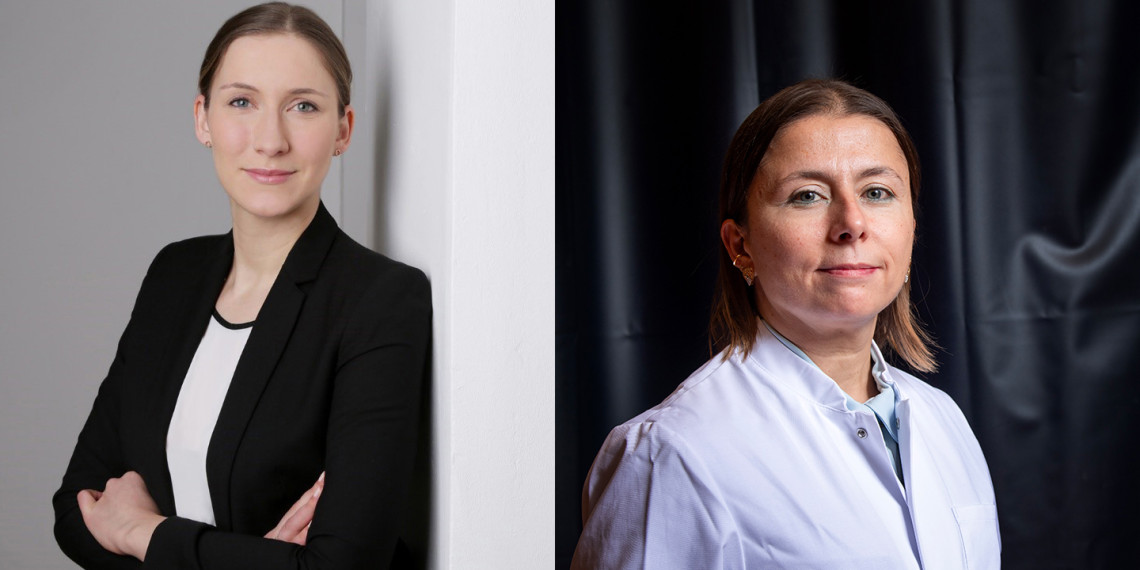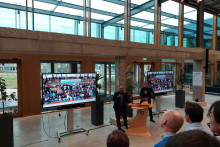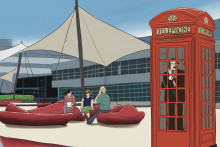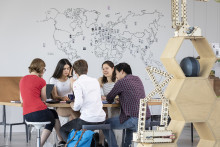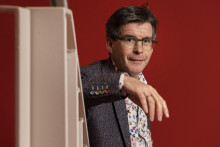Fischer and Acar are both members of the Young Academy of the UT, a community of young academics. They filled out the recent U-Today survey on the internationalisation debate. And both were willing to elaborate their views on the matter and the election results. Their current sentiments summarized: ‘scared’ and ‘concerned’.
‘Promises not being kept’
‘The internationalisation debate is a topic that concerns me as a foreigner working in a different country’, says the German-born Fischer, assistant professor in the section Public Administration (BMS faculty). ‘I came here for certain reasons, which included the Dutch being open, inclusive and welcoming. That’s what I always noticed in the past at conferences; Dutch academics always being very welcoming, inclusive and very internationally oriented.’
'The debate questions whether I will be fit to teach here in the future' - Caroline Fischer
The internationalization debate started around this time last year. And it’s been ongoing for the past year. ‘It’s a debate which affects my work, because it also questions whether I will be fit to teach here in the future, should certain plans become reality’, says Fischer. ‘And it’s also in other measures, like Pieter Omtzigt proposing to get rid of the 30 percent tax advantage for expats. That would also affect me personally.’
Still, Fischer says she’s ‘not the person in the worst position’. ‘Things are a bit ambiguous for me. I’m from Germany and I can understand quite some Dutch – especially the local dialect here near the border. And when I walk on the streets, it’s not me that’s getting strange looks. Still, there were these sort of promises being made to me in recruitment. Promises that are not being kept in a way, if I look at the situation at this moment.’
‘Narrative changed’
Canan Acar, assistant professor at the Thermal Fluid Engineering department (ET faculty), says that she fears the fallout of the recent elections. ‘I’m scared of this movement in Dutch politics. I’m from Turkey originally, so I have seen populist politicians gaining the upper hand. But I did not expect that to happen in The Netherlands. There was a bad economy for a couple of years and now a right-wing leader with quite extreme ideas received the most votes.’
Acar fears that political sentiments will be reflected in the corridors, offices and lecture halls on campus. ‘When I came here in 2021, I was so happy to be included in a community. Like a lot of international academics, I left my life behind to build up something new here. I’ve worked in the competitive and toxic academia of North America. Here, I felt included and sensed that I belong here. That was the unique selling point of the Netherlands. But now, the narrative has changed.’
Comparing the Quran to Mein Kampf
Both young academics give examples of that changing narrative. ‘You can see it shifting in the little things. Looking at some official emails being sent. They used to be written in English first, then Dutch below. Since the internationalisation discussion and talks about a new parallel bilingualism policy, I noticed English first is no longer a default.’ Scrolling a little bit is small beer compared to other issues, says Fischer. ‘I have the fortune of working in a very international setting. But I know of international employees having to fight for English being spoken during meetings. If that is how the proposed parallel bilingualism policy will look like in practice, I fear it will hurt a lot of young academics.’
'Colleagues start to explain, to rationalize and in some cases justify the election outcomes' - Canan Acar
Acar has more poignant examples. ‘The discussion about cutting the 30 percent tax advantage. I heard a colleague saying that this tax advantage is unfair. In academia, I hope the labour agreements are robust enough to avoid pay cuts, but I have expat friends in industry who fear exactly that happening to them.’
Acar also hears people speaking of two different kinds of immigrant groups. ‘What I hear is that I’m apparently one of the good ones… As if there’s a way to divide immigrants into good and bad. What also scares me how the sentiments get mixed up. I’m not from a strong religious background and I’m as horrified by religious extremism as the next person. But I heard someone in these very corridors comparing the Quran to Mein Kampf. How can that be acceptable?’
Perfect storm
Both Acar and Fischer find it worrisome if comments like these become natural. ‘Colleagues start to explain, to rationalize and in some cases justify the election outcomes. Of Geert Wilders being more mild’, says Acar. ‘I know things will not change overnight, the political system in the Netherlands won’t allow for that. But it’s the gradual change I fear.’
'It starts with a provocative comment, but it can lead to a normalization of language that is not normal' - Caroline Fischer
‘It’s a slippery slope’, adds Fischer. ‘It starts with a provocative comment, but it can lead to a normalization of language that is not normal, that discriminates. What also comes together with this anti-movement is the already present competitiveness in academia. There is a scarcity of jobs and limited possibilities of making a career. Everyone is fighting for their place already.’
Combine the internationalisation discussion, the election outcome, competitiveness in academia and the UT’s current financial issues, both Acar and Fischer speak of a ‘perfect storm’. ‘It’s multifaceted, that makes this situation even more uncertain and insecure’, says Fischer.
Scapegoats
The young academics find it ironic how The Netherlands are now dealing with internationalisation. ‘Especially considering the demographic developments’, says Acar. ‘Long-term trends show that Dutch influx at universities will decrease and technical studies suffer even more. So this country need these international academics. If I have a vacancy out for a PhD candidate, there’s hardly ever a Dutch applicant.’ Fischer adds: ‘The growth this country has seen over the last two decades would not have been possible without migrants. What you now see is a tendency to push the people away that you are trying to keep. On false pretenses.’
'I want to hear vocal support from this community. How we react defines who we are.’ - Canan Acar
Being an international in The Netherlands is ‘like paying the rent, but not having a say’, adds Acar. ‘Not only for us in academics, but also for expats in industry. We’re not here to take your homes or steal your jobs. We want to improve your country, do research and educate, secure patents. Everything I do is for the benefit of The Netherlands. But people are just angry at the system and are looking for scapegoats. I don’t want to hear understanding for my situation in these corridors, I want to hear vocal support from this community. How we react defines who we are.’
But wasn’t that exactly what UT President Vinod Subramaniam voiced after the election results? ‘That statement was much appreciated. I can see the executive board trying’, says Fischer. ‘But with all these different backgrounds at this university, diversity is something you actively have to manage.’ She observes a kind of ‘social segregation among students. ‘The international and the Dutch students rarely mix and both groups tend to stay in their comfort zones. The UT claims to be very diverse, but that’s diversity on paper. There is a lot of talk on diversity, but I believe more action is needed.’
Right wing on the rise
Would they consider leaving The Netherlands? At the moment, I’m not considering quitting my job’, says Fischer. ‘I might, if the consequences of the internationalisation debate and the new language policy become too negative. In that case, universities in The Netherlands aren’t the only place where I can work. But I do not consider it for now. My main question is: if I can’t conduct my research anymore somewhere, why would I stay?’
‘I’ve been having these intrusive thoughts of the possibility of leaving’, says Acar. ‘This is the fourth country I’ve been working in, after Turkey, the USA and Canada. And in every country I’ve seen the right wing on the rise, and I’ve seen the chances of doing the things I’m good at decreasing. Once I stop feeling a sense of belonging, of being included and recognized… If that goes away, I will leave.’


